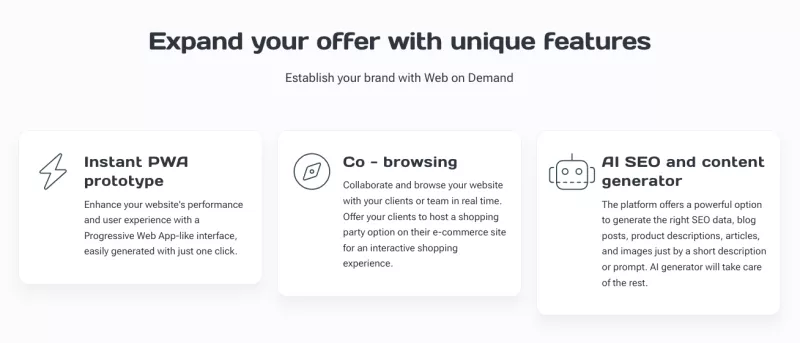Websites serve as the virtual face of organizations and play a vital role in attracting and engaging customers. As the demand for websites continues to grow, the field of website development is evolving rapidly. One significant trend that has emerged in recent years is the rise of on-demand website development services. In this blog post, we will explore the future of website development and how on-demand services are reshaping the industry.
Before we delve into the future, let's take a moment to understand the past. Website development has come a long way since the early days of the internet. In the late 1980s and early 1990s, websites were primarily static and consisted of simple HTML pages. As technology advanced, so did the capabilities of websites. The introduction of CSS, JavaScript, and server-side programming languages allowed for more dynamic and interactive web experiences.
With the advent of content management systems (CMS) in the early 2000s, website development became more accessible to non-technical users. These CMS platforms provided pre-built templates and simplified the process of creating and managing websites. However, they still required a certain level of technical knowledge to customize and optimize.
Over the past decade, on-demand services have revolutionized various industries, and website development is no exception. On-demand website development services refer to platforms and marketplaces that connect businesses or individuals in need of a website with skilled developers who can deliver customized websites quickly and efficiently, or provide polished templates for a website that can be easily adjusted to different needs. These services aim to streamline the website development process by eliminating the need for lengthy hiring processes and providing instant solutions for building an online presence.
The growing popularity of on-demand website development services can be attributed to the numerous advantages they offer. Let's explore some of these advantages:
Cost-Effectiveness: Traditional website development projects often require hiring a full-time developer or outsourcing the work to an agency, both of which can be expensive. On-demand services allow businesses to pay for development services on a per-project or per-hour basis, eliminating the need for long-term commitments and reducing costs. The second option is DIY (Do-It-Yourself) by choosing a suitable template for a website and optimizing it to the specific needs.
Speed and Efficiency: On-demand development services leverage the expertise of skilled professionals who are experienced in delivering websites quickly and efficiently. Businesses can get their websites up and running within a shorter timeframe, enabling them to start attracting customers and generating revenue sooner.
Flexibility and Scalability: On-demand services provide businesses with the flexibility to scale their website development efforts as needed. Whether it's a small project or a large enterprise-level website, businesses can easily find developers with the right skillset to meet their requirements or choose a template that can be easily adjusted with drag-and-drop components.
Access to Specialized Skills: On-demand platforms often have a diverse pool of developers with expertise in various programming languages, frameworks, and design principles. This allows businesses to find developers with specialized skills that align with their specific project needs.

To illustrate the impact of on-demand website development services, let's consider a few real-world scenarios:
Scenario 1: Small Business with Limited Resources
A small local business wants to establish an online presence by creating a professional website. However, they have a limited budget and don't have the technical expertise to build the website themselves. By using an on-demand website development service, the business can find a skilled developer who can create a customized website within their budget and timeline or buy a specific template and optimize it following simple instructions. This enables the business to compete with larger players in their industry and attract customers online.
Scenario 2: Startup in Rapid Growth Phase
A tech startup has experienced rapid growth and needs to enhance its existing website to accommodate increased traffic and functionality. Instead of hiring an in-house development team, which may be costly and time-consuming, the startup decides to leverage an on-demand service. They find developers with experience in scaling websites and quickly implement the necessary changes to handle the growing user base. This allows the startup to focus on its core business objectives while ensuring a seamless user experience for its customers.
Scenario 3: Non-Profit Organization with Limited Technical Expertise
A non-profit organization wants to revamp its outdated website to better communicate its mission and attract volunteers and donors. However, the organization lacks the technical skills to design and develop the website itself. By utilizing an on-demand website development service, the non-profit can connect with a developer who understands their unique needs and can create a visually appealing and user-friendly website. This revitalized online presence helps the non-profit reach a wider audience and achieve its goals more effectively.

To better understand the future of on-demand website development services, let's explore some of the current trends in the industry:
Artificial Intelligence (AI) Integration: As AI technologies continue to advance, integrating AI capabilities into websites is becoming increasingly popular. On-demand developers with experience in AI can help businesses leverage chatbots, personalization algorithms, and data analytics to enhance user experiences and drive conversions.
Mobile-First Approach: With the rise of mobile devices, websites must be optimized for mobile viewing. On-demand developers who specialize in responsive design and mobile development can ensure that websites are visually appealing and functional across various screen sizes and devices.
E-commerce and Online Marketplaces: The e-commerce industry is booming, and businesses are increasingly looking to establish online stores or marketplaces. On-demand website development services can provide businesses with the expertise to create secure and user-friendly e-commerce platforms that drive sales and customer satisfaction.
Progressive Web Apps (PWAs): PWAs combine the best features of websites and mobile applications, providing users with a seamless and app-like experience. On-demand developers well-versed in PWAs can help businesses leverage this technology to increase user engagement and retention.

Looking ahead, on-demand website development services are poised to shape the future of the industry in several ways:
Increased Accessibility: As technology continues to advance, on-demand services will become even more accessible to non-technical users. User-friendly platforms and intuitive interfaces will enable individuals and businesses without coding knowledge to create and manage their websites effectively.
Automation and AI-driven Development: With the integration of AI and automation, on-demand services will streamline the website development process even further. AI-powered tools can assist developers in coding, testing, and optimizing websites, reducing time and effort required for manual tasks.
Global Collaboration and Remote Work: On-demand services enable businesses to collaborate with developers from around the world, breaking down geographical barriers. The future of website development may see an increase in remote work and global collaboration, as businesses can tap into talent pools regardless of location.
Customization and Personalization: On-demand developers will continue to focus on delivering highly customized and personalized websites to meet individual business needs. AI technologies will play a significant role in understanding user preferences and tailoring web experiences accordingly.

On-demand website development services are shaping the future of the industry by offering cost-effective, efficient, and accessible solutions for businesses and individuals. These services enable businesses to create customized websites quickly, access specialized skills, and scale their development efforts as needed. As technology advances, we can expect to see further integration of AI, automation, and global collaboration in on-demand website development. The future implications of these services include increased accessibility, automation, and personalization. Embracing on-demand website development can empower businesses to stay competitive in the ever-evolving digital landscape.

